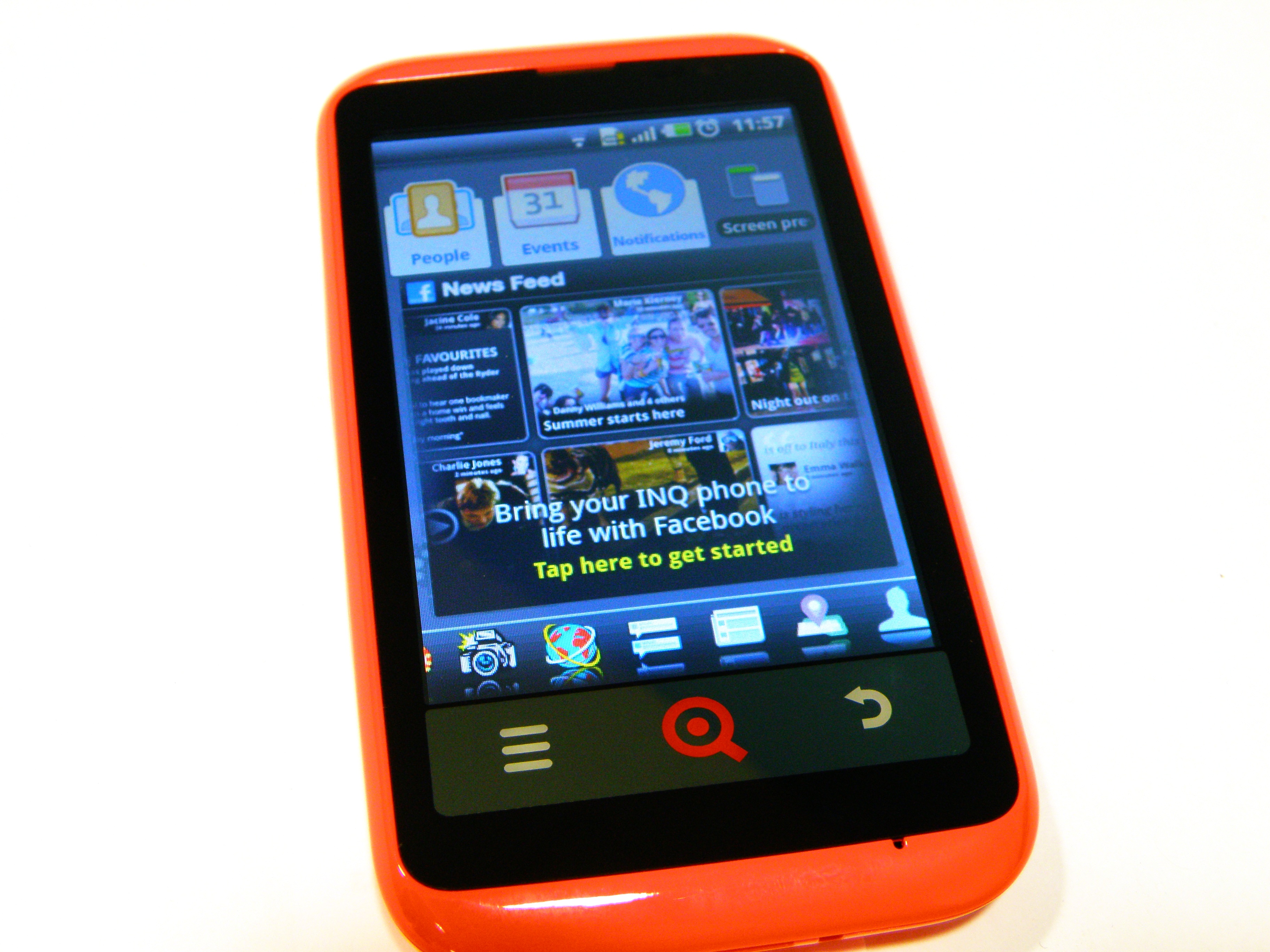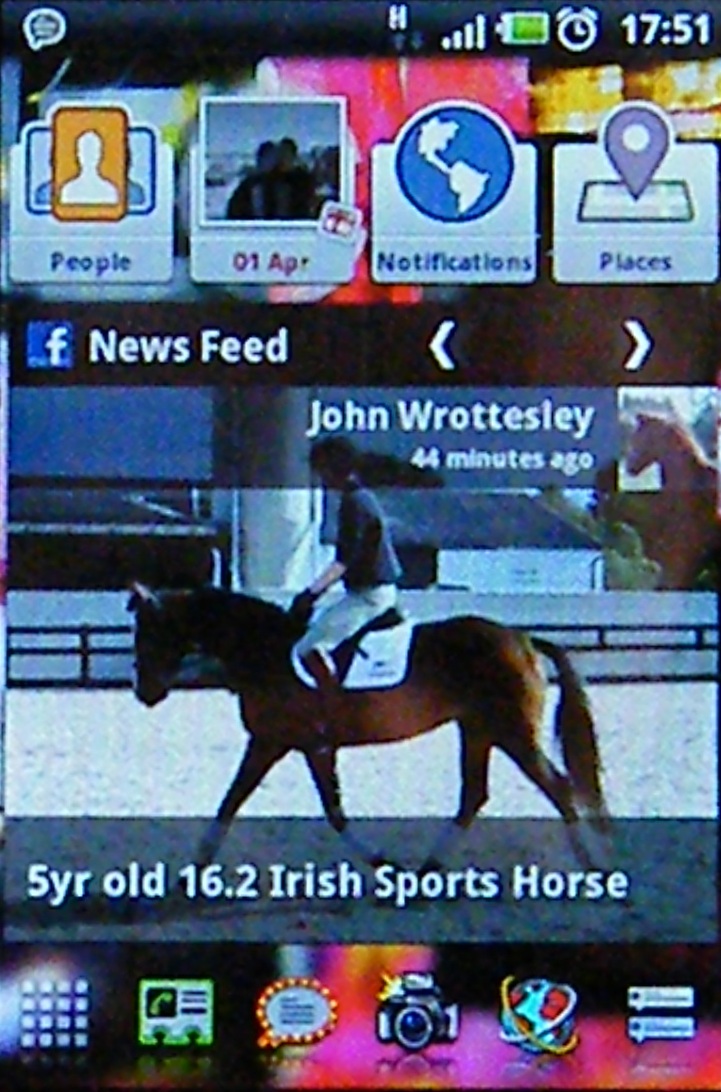Are patent wars defining Android's future?
INQ explains its alternative move in smartphone market

Sign up for breaking news, reviews, opinion, top tech deals, and more.
You are now subscribed
Your newsletter sign-up was successful
INQ has enjoyed modest success in the mobile phone market, firstly as the manufacturer of the early 'Skype phones' and more recently the Android-powered INQ Cloud Touch.
The latter smartphone featured an innovative UI on top of the normal Android OS, and was considered the main selling point of the device - but last month INQ took the curious step of releasing its interface to the Android market for free.
The interface basically takes the normal Facebook app for Android, splits it into separate parts (such as People, Events and Notifications) and also comes with a full screen widget to show you pictures and statuses together in a constantly updating scrolling window.
We spoke to recently departed CEO Frank Meehan to see why the move was made and how the company intended to market its phones with the coolest function now available for free to whoever wanted to download it and whether the recent patent wars over the legality of Android have had an effect.
"The decision was made in November to release our software to the market, so we'll start to see the fruits of that in the second half of the year. But remember, there are billions of phones out there, so we're not going to [cannibalise sales of the INQ Cloud Touch].
"With a base of software a company can do a lot, it can help to go out and help get a good base of users to get to know the INQ brand."
Software first
Meehan suggests that INQ's approach - to bring software that offers more visually arresting information rather than the current sea of icons - will help differentiate the brand in a way the handsets never could:
Sign up for breaking news, reviews, opinion, top tech deals, and more.
"We do take our time with our handsets - probably a little too much time. While we're continuing to look at releasing devices, we're also looking at using those handsets to test things to get a totally integrated experience for customers, so we've got a lot of people working on software.

"The INQ Cloud Touch was our first Android and we developed a lot of cool software on it. We don't want to constrain ourselves to handsets - over the next couple of years our guys are going to be working hard on software too, as we think this can bring more recognition."
It's an alternative notion to try and become a company that jumps from being a small-scale handset manufacturer to a provider of software - especially one that currently offers its platform for free and without adverts.
Nothing comes for free
Software that comes for free and increases functionality either is the work of solo developers that just create things for fun, or big brands looking to supplement hardware - so why would a smaller firm, one that's spent many man hours to create the software overlay as well as a firm, look to release it with no return on the investment?
"At this stage too few people are buying anything on Android - so at this point we're looking at working with software, although we are looking at monetising it in the future," admits Meehan.
"To be honest, we're just trying to get it out there as there are a lot of opportunities [in the software space], and we've got big plans to bring a more visual experience to apps above and beyond Facebook.
"We've got a lot to do around brand recognition at the moment, which is why we want to get the software out there.
"The market will evolve quickly, but hardware is accelerating out of sight - in the future there will be no mobile market, just a screen; and what design can you really do when the device is essentially just a screen?
"What we're seeing in mobile at the moment is a lot of text-based stuff, and we want to enable devices with more visual based information. We want it not to be hard work for users to use the homes screen - we want to get content to it, and the best way, we think, is to visualise personalised content.
"Contact lists are still largely text based and we want to develop that further - in the future address books will change and become less text-heavy and far more visual so we really want to be a part of that."
It seems possible that INQ may give up on hardware creation altogether - Meehan points out that the patent wars circling around Android have changed the way the company is thinking about developing handsets on Google's platform.
The US market is also a challenge for any prospective hardware manufacturer to make any kind of impression in an area already saturated with Android phones - so Meehan thinks offering branded software that can be used to enhance a phone will give the company a much better chance of recognition:
"It's fascinating to see which devices people are downloading our software on - it's most popular on Samsung phones, then the Nexus range and then HTC handsets."
"Our next step is to make sure people actually like the software - and our next release is coming soon and will include a lot more stuff.
"We're looking at making more rapid releases in software, just to get as much stuff as possible out there."
Given the choppy patent waters many Android phone manufacturers are now finding themselves attempting to navigate, INQ might not be the last brand to think about evolving to offer a different kind of service to smartphone users.
-----------------------------------------------------------------------------------------------------

Gareth has been part of the consumer technology world in a career spanning three decades. He started life as a staff writer on the fledgling TechRadar, and has grew with the site (primarily as phones, tablets and wearables editor) until becoming Global Editor in Chief in 2018. Gareth has written over 4,000 articles for TechRadar, has contributed expert insight to a number of other publications, chaired panels on zeitgeist technologies, presented at the Gadget Show Live as well as representing the brand on TV and radio for multiple channels including Sky, BBC, ITV and Al-Jazeera. Passionate about fitness, he can bore anyone rigid about stress management, sleep tracking, heart rate variance as well as bemoaning something about the latest iPhone, Galaxy or OLED TV.